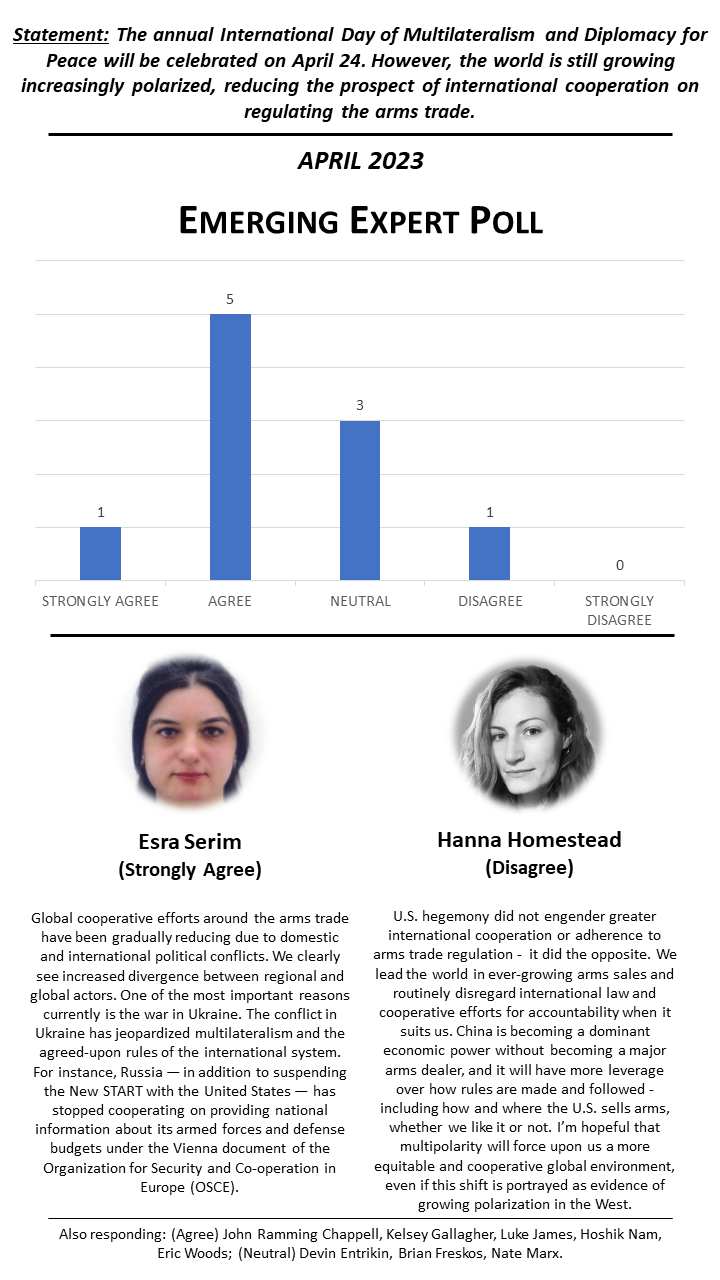Prospects for multilateralism?
The Forum asks Emerging Experts*
April 21, 2023
April 21, 2023
STATEMENT: The annual International Day of Multilateralism and Diplomacy for Peace will be celebrated on April 24. However, the world is still growing increasingly polarized, reducing the prospect of international cooperation on regulating the arms trade.
See all responses below, and click on photos for more information about each expert:
Strongly Agree
|
Esra Serim
Global cooperative efforts around the arms trade have been gradually reducing due to domestic and international political conflicts. We clearly see increased divergence between regional and global actors. One of the most important reasons currently is the war in Ukraine. The conflict in Ukraine has jeopardized multilateralism and the agreed-upon rules of the international system. For instance, Russia — in addition to suspending the New START with the United States — has stopped cooperating on providing national information about its armed forces and defense budgets under the Vienna document of the Organization for Security and Co-operation in Europe (OSCE). |
Agree
|
Kelsey Gallagher
Effective international arms control regimes rely on trust, cooperation, and goodwill — virtues in increasingly short supply. As global polarization escalates, particularly following Russia’s 2022 invasion of Ukraine, some states have signaled a willingness to buck standing arms control obligations in pursuit of perceived short-term strategic benefits. Such departures could very well set longer-term negative precedents, particularly related to information sharing, transparency, and standardized risk assessments, in turn resulting in a less secure global community. |
|
Luke James
Polarization inherently makes cooperation more difficult. However, broadly speaking, arms control treaties can provide a unique forum for discussion and cooperation — such as the Nuclear Nonproliferation Treaty, Mine Ban Treaty, Convention on Cluster Munitions, Chemical Weapons Convention, and START Treaties. It is likely that newer treaties — such as the Treaty on the Prohibition on Nuclear Weapons — or on emerging topics with global interest — such as like artificial intelligence/killer robots — will continue this trend. Meanwhile, the gender-sensitive lens and other contemporary approaches will offer new angles to cooperation. However, I think cooperation on arms trade at the small arms and light weapons (SALW) and conventional weapons level is likely to reduce as most of the world re-arms. This may endanger the value of the Arms Trade Treaty. |
|
Hoshik Nam
The world is becoming increasingly polarized, especially due to the ongoing Russo-Ukraine War. This polarization has hindered prospects for international cooperation in regulating the arms trade. Despite this, there have been efforts at the international level to regulate arms transfers, such as the Arms Trade Treaty (ATT). As we mark the anniversary of the International Day of Multilateralism and Diplomacy for Peace (IDMDFP), it is crucial for the international community to come together and promote better control of the international arms trade through cooperative efforts. |
|
Eric Woods
The increased political and military competition between the major powers is increasing the risk of a major war and frustrating efforts to track and cooperate against the dangerous proliferation of new and old weapons systems. The Wassenaar Arrangement, while imperfect, could become another casualty of the Russo-Ukrainian war. The breakdown of various bilateral and multilateral architectures increases the risk of arms racing between states and lower transparency on issues of national defense for citizens. |
Neutral
|
Devin Entrikin
This is no doubt a difficult period for international cooperation, but I do not want to fall into fatalistic thinking that feeds a self-fulfilling prophecy. Inclusive multilateral institutions are already in place for regulating the arms trade and facilitating greater transparency. Agreements like the Arms Trade Treaty continue to evolve and harden as key institutions for information exchange. This existing framework will endure regardless of a return to strategic competition and major power politics. Ultimately, the transformation toward a multipolar world order and the need for multistakeholder approaches to governance challenges may threaten the previous liberal international order, but it is far from certain whether what emerges will be less effective in tackling 21st century transnational problems like the downside risks of the international arms trade. |
|
Brian Freskos
The global arms control movement is facing several challenges. Russia’s invasion of Ukraine, China's growing nuclear arsenal, continued increases in global military spending — these are only a few of the many factors fueling legitimate concerns about arms proliferation and international conflict prevention. However, it is important to note that there have been some recent successes, including the 2022 signing of an international Political Declaration on explosive weapons to protect civilians in populated areas. So although polarization remains an issue, there is still potential for countries to reach consensus on important arms-related issues. |
|
Nate Marx
Though the world is growing more polarized, the effect this will have on regulating the arms trade is unclear. While polarization could plausibly lead to a race to the bottom, where the United States, China, and Russia compete to sell arms to countries regardless of human rights practices, fear of rivals’ security partnerships could also lead the major powers, especially the United States, to be more open to international frameworks managing the arms trade. |
Disagree
|
Hanna Homestead
U.S. hegemony did not engender greater international cooperation or adherence to arms trade regulation - it did the opposite. We lead the world in ever-growing arms sales and routinely disregard international law and cooperative efforts for accountability when it suits us. China is becoming a dominant economic power without becoming a major arms dealer, and it will have more leverage over how rules are made and followed - including how and where the U.S. sells arms, whether we like it or not. I’m hopeful that multipolarity will force upon us a more equitable and cooperative global environment, even if this shift is portrayed as evidence of growing polarization in the West. |
* Inclusion in this list does not indicate agreement with or endorsement of the opinions of others, nor do the opinions necessarily reflect those of the institutions with which emerging experts are affiliated. To learn more about the Emerging Experts list and program, click here. The Forum itself does not take positions.
This program is supported by the Rosa-Luxemburg-Stiftung New York Office with support from the German Ministry for Economic Cooperation and Development (BMZ). The Forum's work is further supported by the Carnegie Corporation of New York and the Rockefeller Brothers Fund.
This program is supported by the Rosa-Luxemburg-Stiftung New York Office with support from the German Ministry for Economic Cooperation and Development (BMZ). The Forum's work is further supported by the Carnegie Corporation of New York and the Rockefeller Brothers Fund.











